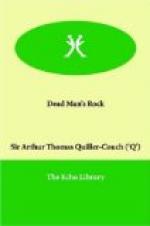“What do you think of it?” said the first.
“What can I?” answered the other. “And how can I tell you? It is altogether above words.”
He was right. It was not so much admiration as awe and worship that held the house that night. I have heard a man say since that he wonders how the play could ever have raised anything beyond a laugh. He should have heard the sobs that every now and then would break uncontrollably forth, even whilst Claire was speaking. He should have felt the hush that followed every scene before the audience could recollect itself and pay its thunderous tribute.
Still she never looked towards me, though all the while my eyes were following my lost love. Her purpose—and somehow in my heart I grew more and more convinced that some purpose lay beneath this transcendent display—was waiting for its accomplishment, and in the ringing triumph of her voice I felt it coming nearer—nearer—until at last it came.
The tragedy was nearly over. Francesca had dismissed her old lover and his new bride from their captivity and was now left alone upon the stage. The last expectant hush had fallen upon the house. Then she stepped slowly forward in the dead silence, and as she spoke the opening lines, for the first time our eyes met.
“Here then all ends:—all
love, all hate, all vows,
All vain reproaches.
Aye, ’tis better so.
So shall he best forgive
and I forget,
Who else had chained
him to a life-long curse,
Who else had sought
forgiveness, given in vain
While life remained
that made forgiveness dear.
Far better to release
him—loving more
Now love denies its
love and he is free,
Than should it by enjoyment
wreck his joy.
Blighting his life for
whom alone I lived.
“No, no. As God
is just, it could not be.
Yet, oh, my love, be
happy in the days
I may not share, with
her whose present lips
Usurp the rights of
my lost sovranty.
I would not have thee
think—save now and then
As in a dream that is
not all a dream—
On her whose love was
sunshine for an hour,
Then died or e’er
its beams could blast thy life.
Be happy and forget
what might have been,
Forget my dear embraces
in her arms,
My lips in hers, my
children in her sons,
While I—
Dear
love, it is not hard to die
Now once the path is
plain. See, I accept
And step as gladly to
the sacrifice
As any maid upon her
bridal morn—
One little stroke—one
tiny touch of pain
And I am quit of pain
for evermore.
It needs no bravery.
Wert thou here to see,
I would not have thee
weep, but look—one stroke,
And thus—”
What was that shriek far back there in the house? What was that at sight of which the audience rose white and aghast from their seats? What was it that made Sebastian as he entered rush suddenly forward and fall with awful cry before Francesca’s body? What was that trickling down the folds of her white dress? Blood?




